Initiatives for Climate Change Response in Line with the TCFD Framework
The Shimadzu Group considers environmental issues to be among the most critical management challenges. In particular, we are actively addressing climate change by working to reduce CO2 emissions throughout our business activities, including across the supply chain. This includes promoting innovation through Green Transformation (GX) and delivering environmentally conscious products and solutions. We also disclose relevant information in line with the recommendations of the Task Force on Climate-related Financial Disclosures (TCFD), and are strengthening our response accordingly.

Governance
The Shimadzu Group discusses climate-related risks and opportunities, as well as measures to resolve managementrelated issues, at the“ Environmental Meeting” (chaired by the President and held twice a year), a subcommittee specializing in environmental issues.Discussions are reported to the Executive Committee, and are also reported to and discussed by the Board of Directors, thereby ensuring appropriate monitoring and supervision by the Board. The Board of Directors also deliberates and decides on important matters related to Shimadzu’s environmental management.
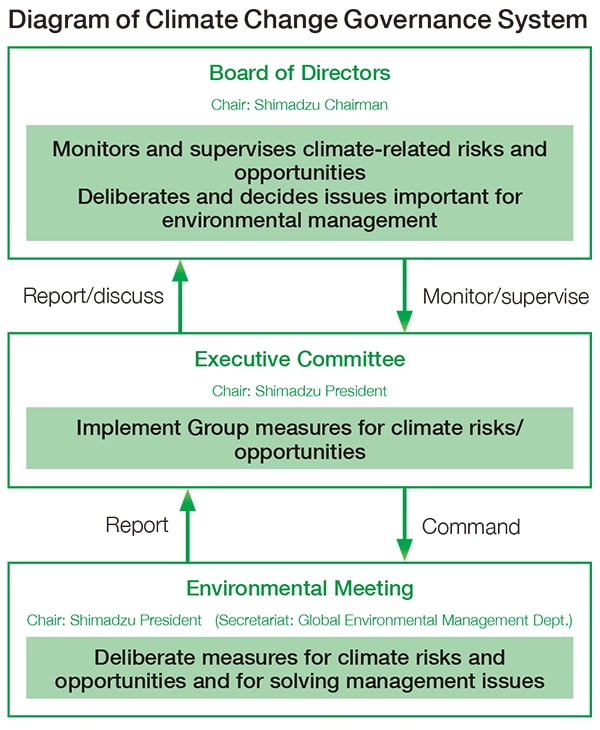
Risk Management
The Global Environmental Management Department is the main body that identifies individual climate change risks that could affect the Shimadzu Group’s business, strategy, and finances. In assessing the risks, Shimadzu identifies risks that are highly significant to the Group by assessing the degree and timing of the impact with reference to climate change scenarios issued by the International Energy Agency (IEA) and other organizations. The results of the identification and assessment are discussed and confirmed by the Environmental Meeting.
Strategy for Addressing Climate Change
1. Identify Climate-Change Risks and Opportunities
When identifying climate-related risks and opportunities that could affect Shimadzu Group businesses, strategies, or finances, we identify and organize climate change-induced drivers expected to have a large impact on Shimadzu businesses in each of two global scenarios, one where carbon reduction efforts result in a 1.5 °C temperature increase and the other where current global warming trends increase temperatures by 4 °C.
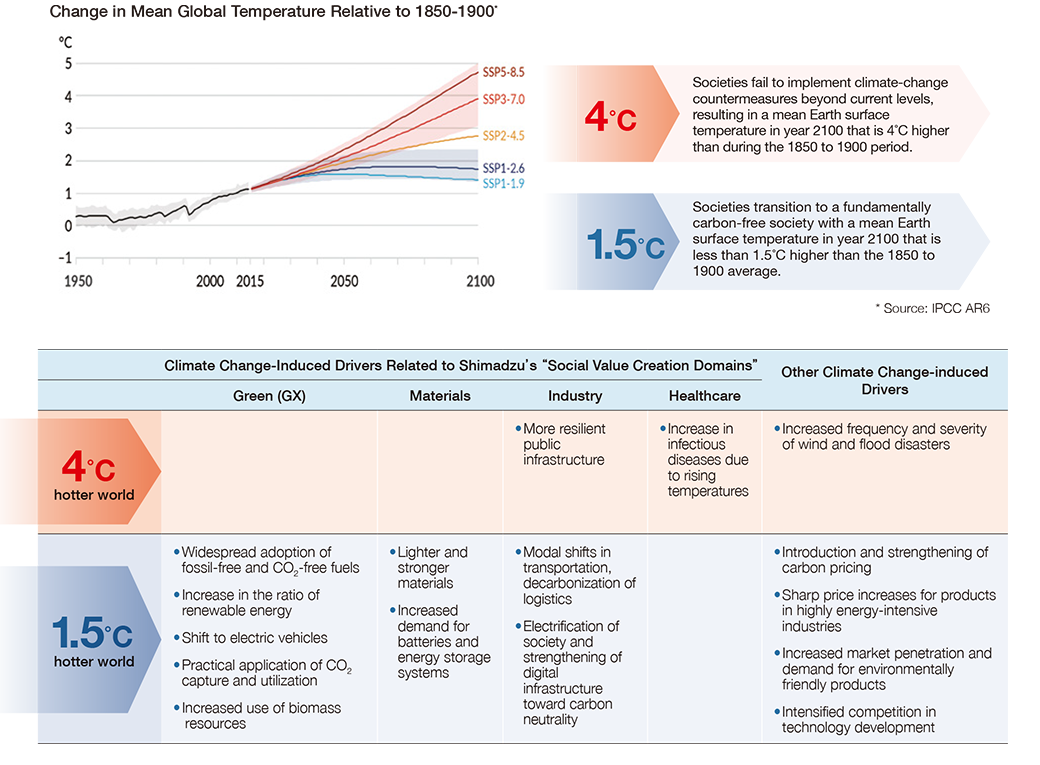

Using the climate change-induced drivers, the main risks and opportunities for the Shimadzu Group regarding the climate change were identified and evaluated in terms of timeframe and impact level based on the International Energy Agency (IEA) climate change scenarios and other factors. The results are summarized in the“ List of Main Risks/Opportunities for Shimadzu Businesses” below.
List of Main Risks/Opportunities for Shimadzu Businesses
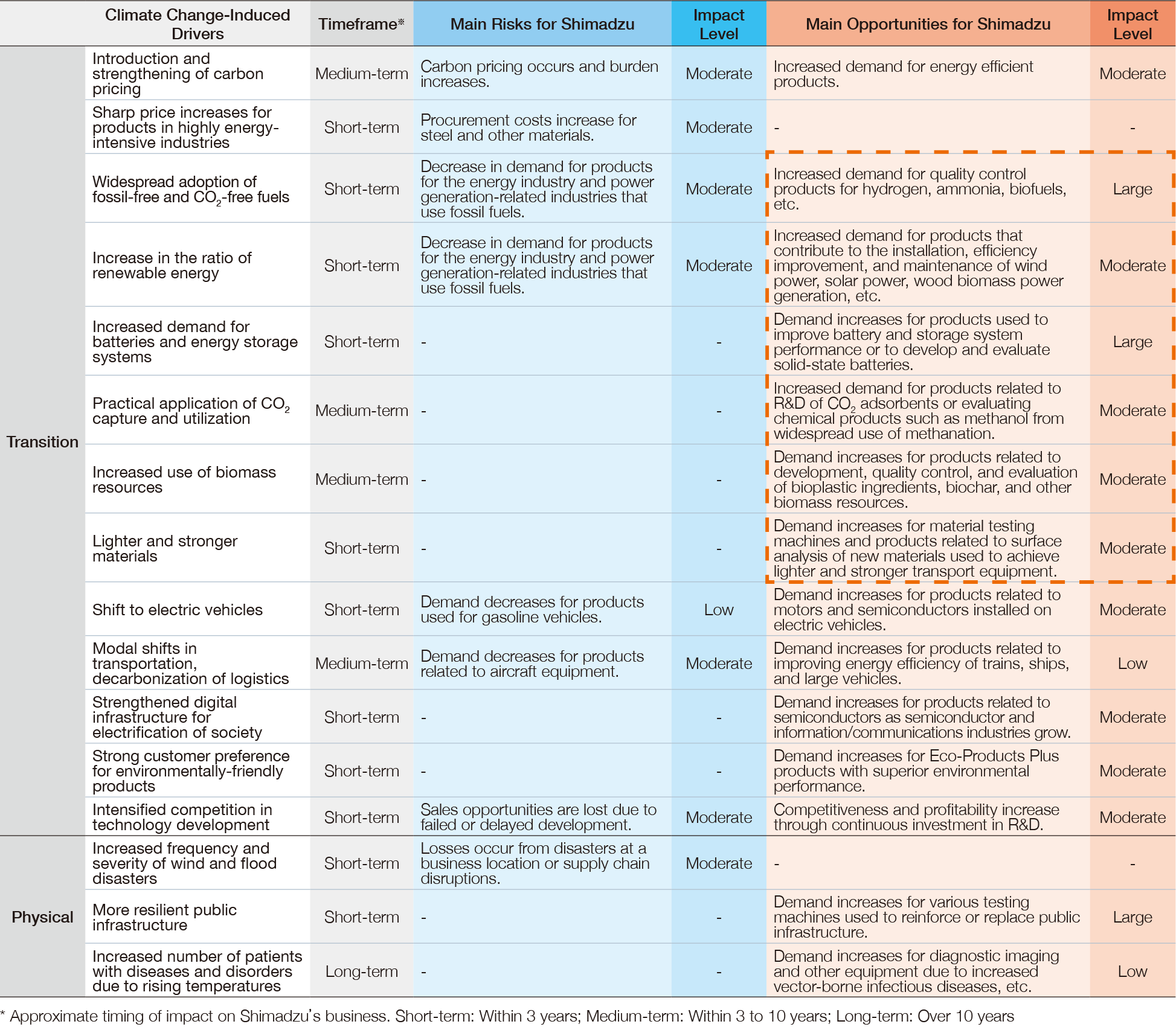
- * Estimated timing of impact on Shimadzu’s business. Short-term: Within 3 years; Medium-term: Within 3 to 10 years; Long-term: Over 10 years
* The level of impact is classified into three categories-Low, Moderate, and High-based on a combination of qualitative assessment and financial thresholds: for revenue,“ Low” refers to less than 500 million yen,“ Moderate” to 500
million to less than 5 billion yen, and“ High” to 5 billion yen or more; for costs,“ Low” refers to less than 50 million yen,“ Moderate” to 50 million to less than 500 million yen, and“ High” to 500 million yen or more.
① Scenario Analysis of Demand Growth for Analytical and Measuring Instruments
While it is expected that research and technological development related to carbon neutrality will continue to advance in various industrial fields, we have conducted a scenario analysis regarding opportunities in the measuring instrument business (expanded demand for analytical and measuring instruments) using multiple temperature range scenarios.

② Analysis of Scenarios for Expanding Demand for Industrial Machinery (Industrial Furnaces for Advanced Ceramics Field)
During the expected advancements in socioeconomic transitions to a carbon-free society, multiple temperature zone scenarios have been used for a scenario analysis of the industrial machinery business (advanced ceramics field).

③Scenario Analysis on Carbon Pricing
As the global transition toward carbon neutrality accelerates, the introduction and strengthening of carbon pricing schemes is anticipated in many countries. In response to this trend, we conducted a scenario analysis to assess the potential financial impact of carbon pricing on our business. The analysis focused on (a) carbon pricing costs associated with Scope 1 and 2 emissions, and (b) increased procurement costs associated with Scope 3 Category 1 emissions.
(a) Carbon Pricing Costs Associated with Scope 1 and 2 Emissions
| Analyzed Risk | We analyzed the financial burden associated with our Scope 1 and 2 emissions. In particular, we focused on the difference in carbon pricing costs depending on whether decarbonization measures are implemented. |
|---|---|
| Assumptions and Methodology | Future carbon pricing costs were calculated using the formula shown below. We estimated the differences in these costs under various climate change scenarios.* Carbon pricing cost = Emissions under each scenario × Carbon price per unit under each scenario
|
| Analysis Results | Under the emissions trajectory illustrated in the figure below, the difference between taking action to meet reduction targets and not taking action is:
 |
(b) Increased Procurement Costs Associated with Scope 3 Category 1 Emissions
| Analyzed Risk | The impact of carbon pricing on upstream GHG emissions in the supply chain (Scope 3 Category 1: purchased goods and services) was analyzed as a risk of increased procurement costs passed on by suppliers to Shimadzu. |
|---|---|
| Assumptions and Methodology | Based on our procurement costs, supplier pass-through rates (with reference to external sources), and carbon pricing per climate change scenario*, we estimated the future annual increase rate in procurement costs.
|
| Analysis Results | The annual increase rate in procurement costs due to carbon pricing from 2030 to 2050 remained below 10% under both scenarios. However, under the decarbonization scenario, the impact of rising carbon prices is greater, highlighting the increasing importance of decarbonization efforts across the entire supply chain. |
2. Impact on Shimadzu’s Business, Strategy, and Finances under Climate Change Scenarios
Results from analyzing the impacts on Shimadzu businesses, strategies, and finances for a carbon-free scenario (1.5°C warming scenario) and the current scenario (4°C warming scenario) are summarized below.
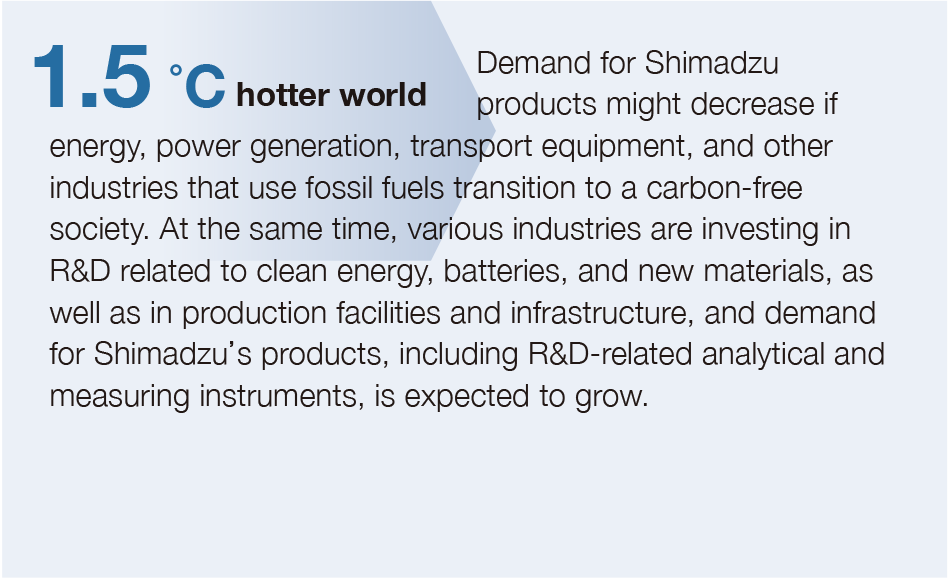
Impact on Shimadzu’s Business, Strategy, and Finances under Climate Change Scenarios
Shimadzu is working to reduce CO₂ emissions in its business activities by actively promoting energy conservation and utilizing renewable energy, and the actual amount of CO₂ emissions in FY2023 was 10,778 tons. We also provide products and services to a variety of industries, including pharmaceuticals,
medical, environmental, energy, semiconductors, and materials, making us unique in that we serve a broad base of client industries. As a result, we believe it is very unlikely that a contraction in any particular industry would have a significant impact on Shimadzu finances.
On the other hand, the scenario analysis on carbon pricing revealed that the progress of global climate change measures could have a certain financial impact on Shimadzu. In particular, under the decarbonization scenario (IEANZE), there is a risk of increased carbon pricing costs associated with Scope
1 and 2 emissions. However, it was found that steadily reducing emissions toward achieving net-zero by 2050 could significantly mitigate carbon pricing costs after 2030.
In addition, regarding the increase in procurement costs associated with Scope3 Category 1 emissions, although the annual rate of increase in procurement costs due to carbon pricing remains below 10% from 2030 to 2050 under the decarbonization scenario, it was found that the impact is greater under the decarbonization scenario, where carbon prices are expected to rise. Therefore, in addition to reducing emissions through collaboration with suppliers and switching to low-carbon materials, it is also important to promote eco-friendly product design by adopting lighter structures, actively using recycled materials,
and reducing the number of components, thereby contributing to emissions reduction across the entire supply chain. Although opportunities from climate change are expected in various industries and fields in both a “1.5 warming scenario” and a“ 4°C warming scenario, ”we recognize that efforts to realize a“ 1.5°C warming scenario” will lead to a reduction in risks for society as a whole. Therefore, Shimadzu is working to achieve the 1.5°C target through its business activities. Specifically, Shimadzu designs all its products to be environmentally friendly, such as by making them more energy efficient, and continues to increase the percentage of Eco-Products Plus products that offer particularly high environmental performance. We also continue to invest in the development and supply of products that contribute to climate change mitigation and adaptation. Overall, we believe that our business, strategy, and finances can remain resilient to climate change by appropriately seizing climate change opportunities and achieving
sustainable growth through the actions and initiatives outlined in the transition plan on the following page.
3. Transition Plan for Achieving a Carbon-Free Society
- Mitigation of Climate Change (Achieve 1.5 °C Target)
To achieve the 1.5 °C target specified by the Paris Agreement, the Shimadzu Group has set a target of net-zero CO2 emissions from business activities by 2050 and is actively working to reduce CO2 emissions accordingly. In addition, to reduce CO2 emissions in our supply chain, we have set a reduction target regarding CO2 emissions from the use of Shimadzu product at customer sites.Targets, performance, and progress for these measures are monitored and overseen under the Climate Change Governance system and reviewed and updated on a regular basis. - Capitalize on and Maximize Opportunities
Shimadzu is committed to strategically developing and supplying products that support both climate change mitigation and adaptation, while helping our customers advance decarbonization in their operations. These initiatives form part of our broader efforts to achieve sustainable growth. In response
to evolving market needs, we will continue to enhance our development infrastructure and supply systems. Our key policies and action plans for each major business field are outlined in the section titled “Shimadzu Group’s Policies and Plans for Initiatives in Each Business Field to Build a Carbon-free Society” (see right).
Hydrogen Energy for a Carbon-Free Society
Hydrogen does not emit CO₂ when burned. It can be produced using a variety of methods, such as water electrolysis and steam reforming, making it a promising next-generation clean energy source. Our technologies are being utilized to support these hydrogen-related applications.
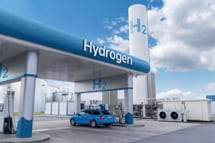
Impurity Analysis in Accordance with Hydrogen Fuel Quality Standards for FCVs: Gas Chromatograph (GC), Gas Chromatograph–Mass Spectrometer (GC-MS)
Leak Testing for Raw Material Storage and Transport Tanks: Hydrogen Leak Detector, MAIVIS Ultrasonic Flaw Detector
Strength Testing in Hydrogen Environments: Precision Universal Testing Machine, Fatigue and Durability Testing Machine
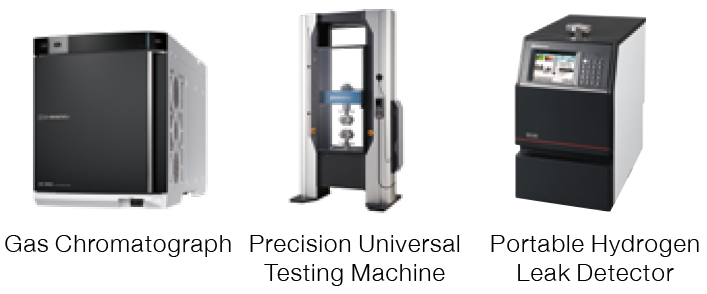
Shimadzu Group’s Policies and Plans for Initiatives in Each of its Business Fields to Build a Carbon-free Society
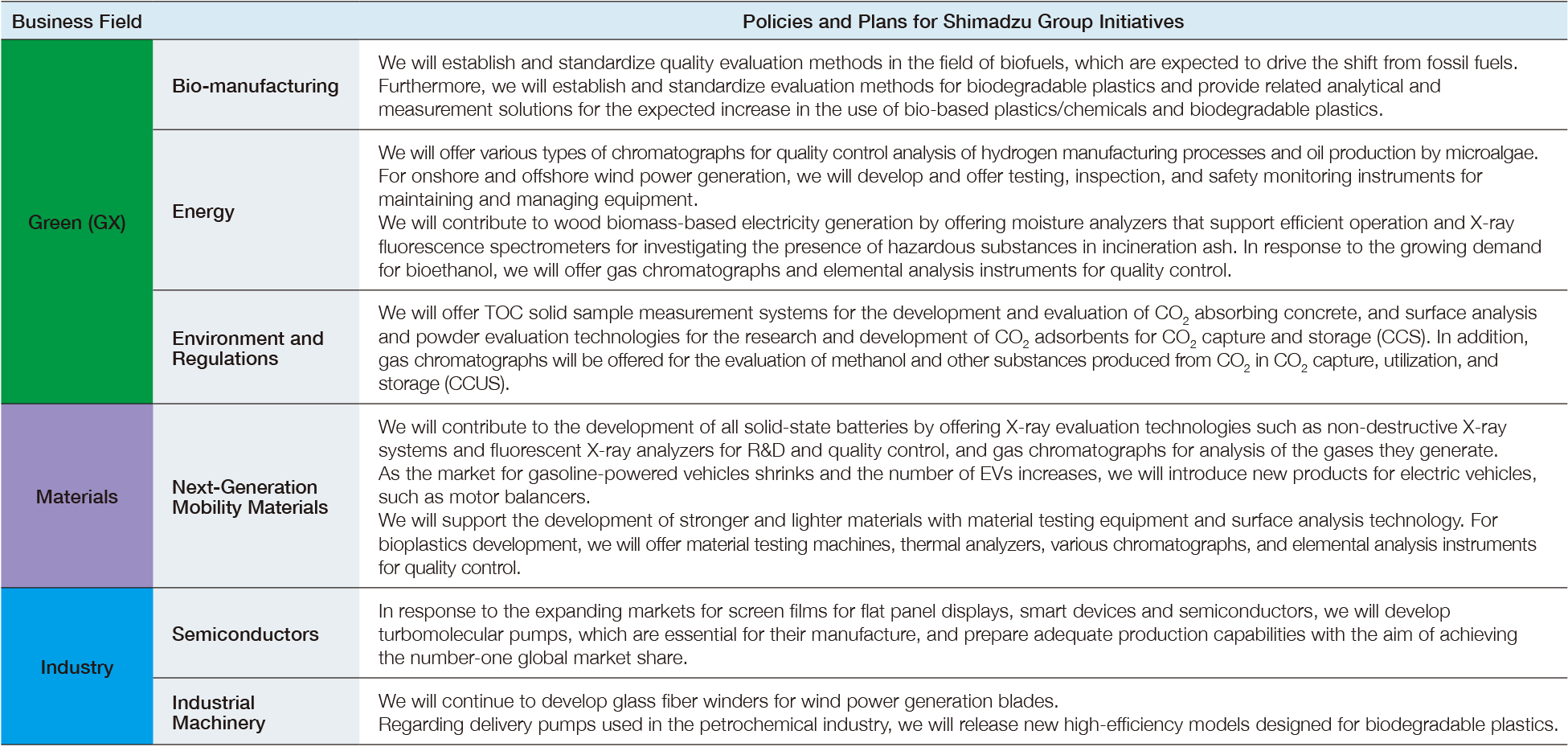
Indicators and Targets
1. Reducing CO2 Emissions
The Shimadzu Group aims at reducing CO₂ emissions from business activities to net-zero (carbon neutral) by 2050.
FY 2050 Targets
- Reducing CO₂ emissions from business activities to net-zero.
- Increasing the percentage of renewable energy use to 100%.
FY 2040 Target
- Reducing CO₂ emissions from business activities by at least 90% compared to FY2017.
FY 2030 Target
- Reducing CO₂ emissions from business activities by at least 85% compared to FY2017.*
- Reducing CO₂ emissions from the use of products sold by the Shimadzu Group by at least 30% compared to FY2020 levels.
- * Obtained SBT“ 1.5°C level” certification for this goal
Shimadzu Group CO₂ Emission Reduction Targets are Validated at the SBT 1.5°C Level
https://www.shimadzu.com/news/9y_wri8ctm13xwu5.html
2. Development and Promotion of Environmentally Certified Products
The Shimadzu Group is working to reduce environmental impact by enhancing the environmental performance of its products. We certify products that demonstrate superior environmental performance compared to previous models as Eco-Products Plus, and feature them in brochures and other materials. We also provide ECO Simulation Software on our website, enabling customers to compare the running costs and estimated CO₂ emission reductions when replacing existing products with newer models. This allows for the visualization of both cost savings and environmental contributions. The Shimadzu Group views the promotion of environmentally advanced products as a business opportunity. By helping our customers reduce their CO₂ emissions through the use of our products, we are contributing to progress toward a carbon-neutral society.


